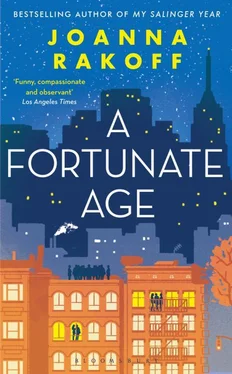“Yeah, it was completely fascist,” said Emily. “Remember in school they tried to do that to the dorm cleaners? There was a huge protest.”
“I think they did it anyway,” said Sadie, picking up one of the small, hard rolls that had accompanied their soup. They loved this café—with its purposefully unhip New England clam-shack decor—and had recently decided that they also loved its neighborhood, the tiny streets south and west of Sixth Avenue—Bedford, Carmine, Downing. “Is that why he was fired? Because he was late?”
Lil shook her head. “He got something wrong in a piece. That story about anarchists. Like, the web allows them to organize without, you know, having a central organizing body. Did you guys read it? In the December issue?”
Sadie and Beth nodded. “Will loved it,” Beth told her.
“Oh my God, he was reporting it for months.” Lil sighed and shook her head. “He talked to, like, a hundred people. And this one guy, he’d asked to be anonymous and Tuck used his name.” Beth looked down at her bowl. She knew, from Will, that this wasn’t nothing. “The guy complained. He’s, like, threatening to sue.”
“Wow,” said Emily.
“I know,” said Lil. “But the thing is they were looking to get rid of Tuck. Or that’s what he thinks. That they knew they could replace him with a twenty-two-year-old—who they could pay, like, a third of his salary.”
“It’s probably true,” said Sadie, breaking off a piece of roll.
“His boss was just on him all the time.” Tuck despised this woman, a severe, slate-haired middle-management type in her fifties, who didn’t, according to Tuck, get Boom Time at all. Lil had met her, just once, and trusted that this was true, but also suspected that the woman sensed Tuck’s resentment and disdain—and behaved accordingly. Tuck believed she was both jealous of him—for being young and successful—and bizarrely attracted to him. She bothered him about obscure grammatical matters, complained about his lateness, and made not-so-subtle—inappropriate, really—comments about his failure to shave on certain mornings. “I don’t know if I ever told you guys this, but back in November, one night he left early to meet me at your play, Em, and she made this big deal about it. I guess he sort of made it out to be my fault and she said, ‘Your wife is demanding, isn’t she? Journalism is for the unattached and ambitious.’”
“Who is she?” asked Sadie. “Rosalind Russell in His Girl Friday ?”
“I know, right.” Emily laughed. “That’s crazy.”
“Wasn’t she, like, the copy chief at Seventeen ?” asked Beth. “Or that’s what Will said.”
Lil nodded. “But she never would have gotten there if she hadn’t been unattached and ambitious ,” she said, smiling wickedly. The truth was, Lil sometimes wondered if Tuck wasn’t making some of this stuff up, skewing his stories so that he seemed the victim. Tuck had terrible problems with authority. It was why, she knew, he’d never become a true star at Columbia. He didn’t get that he had to wend his way into the good graces of his superiors. He hated schmoozing with professors at cocktail parties and readings. He never went to office hours or engaged his advisors in lively discussions of current scholarship or even sought advice from them. Everyone knew academics—toiling away in their nichey salt mines, publishing papers in Eighteenth Century Studies or Gender and Hegemony —wanted to feel needed and appreciated and worshipped by their students. But Tuck made them feel the opposite: unnecessary and outmoded. Which, Lil had to admit, many of them were . But still. It was as though he was determined to lead life in the most difficult way possible, out of some misguided sense of integrity.
He talked constantly of the new regime and the small rebellions planned and enacted by the Slikowskers. Lil listened patiently and sympathetically, but she thought she, in Tuck’s place, might change her habits and adjust her thinking to meet the demands of the new people, who were, after all, simply doing their job, the best they knew how. They were trying to make the magazine operate more like other magazines. Was there anything really so wrong with that?
“The whole thing is so depressing,” lamented Beth. “Ed is just a wreck. He really regrets selling.”
“Then why did he do it?” asked Sadie.
“He needed money,” said Lil.
“His backers were freaking out,” Beth explained. “They’re these software guys. They don’t get that magazines don’t make money overnight. They were threatening to pull the plug.”
“Especially magazines run by people who have no idea how to run magazines,” said Sadie. Lil gave her a dark look, through lowered lids, for Ed’s lack of magazine experience was—as everyone knew—what had made Boom Time great. Ed was a visionary, a genius. At sixteen, he’d earned a modicum of fame for hacking into his high school’s computer system and rearranging students’ schedules, so that uptight AP physics students wound up in health class with dull-minded jocks and cheerleaders. The school’s guidance counselors quickly remedied the prank, but not before Ed’s goal—a Breakfast Club -style commingling of social groups—had been realized and, moreover, reporters had flocked to Pasadena, wanting to interview the techno-socialist. He’d wound up a human-interest item, in the pages of People and Time and USA Today , cheerfully opining on the vicious social structure of the modern high school and the democratizing power of the home computer. Most magazines, he’d told Lil when she’d first met him, were written by “corporate whores and yuppie porn slaves” and filled with “glorified ad copy and assorted insipid drivel.” The world was ready for stories that explored popular culture—for that was what technology was becoming, wasn’t it?—without sycophantic references to demi-celebrities and barely concealed product placement. He’d decided to run Boom Time as if it were “the first magazine to walk the earth.”
The Times mag, in their profile, had run a photo of him at sixteen, in a green Atari T-shirt and too-long jeans, his elbow resting on a boxy Mac Plus, his cheeks, even then, covered with a dense, inky growth. Lil had loved this photo, for reasons she couldn’t explain, and she’d blushed and stammered when next she saw Ed, remembering how she’d lingered over it. The real Ed was somewhat less approachable. He always greeted Lil like an old friend, but he spoke so passionately and forthrightly and earnestly that it perpetually caught her off guard. “What do you think about this impeachment madness?” he’d asked the last time she saw him, in November, before Tuck was fired. “It’s crazy,” she’d said, stupidly, realizing that her thoughts didn’t go much deeper than that. By all rights, he should consider her an idiot. But he didn’t seem to, which made her even more uncomfortable, for this made her the recipient of his charity.
“I think he’s going to leave,” Beth told them.
“And do what?” asked Lil skeptically.
“Go back to MIT, finish his Ph.D., work in the Media Lab.”
“How could he go back?” asked Lil. She seemed almost angry. The girls looked at one another. “To Boston ? To school? After running his own magazine?”
Beth shrugged. “He’s been talking about making a movie. With Jonathan. About this company they wrote about last year. They own the rights. I think he’s working on the screenplay.”
“A movie ?” cried Lil. Her friends looked away, embarrassed by this display of emotion. Why should it matter to her if Ed left Boom Time ? Though, of course, Sadie thought, she felt betrayed. Ed could leave, could go off and do whatever he liked, could rise from the ashes of his success, but Tuck had been forced out, demoralized.
Читать дальше












